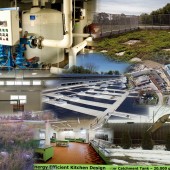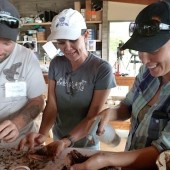
Many K-12 school districts are embracing energy conservation efforts and constructing environmentally sustainable buildings with the purpose of lower operating costs of their facilities. Investments in green infrastructure to improve operating efficiencies and occupant health are important but the impact on green buildings on instructional practice should also be considered. This study focused on teachers’ perceptions of the many impacts of a new sustainably designed middle school on students and teachers and explores the use of the school as a learning laboratory. Grades 6-8 teachers participated in open-ended focus group discussions near the end of the first school year in their new green building. An emergent coding framework was created to characterize conversation topics. Analysis of the coding yielded insights into seven major categories of teachers’ perceptions of the impact of the new green school on their work in the building and their students’ attitudes and academic performance. The seven major coding categories of green infrastructure, student behavior, student awareness, teacher awareness, curriculum, health, and professional development were further analyzed to formulate considerations and recommendations for others to capitalize on the instructional potential of sustainably designed school facilities as learning laboratories.
Continue Reading
We are faced with a multitude of environmental challenges today, including sustainable food, water, land, and energy resources. As we strive to understand and address these resource issues, we become keenly aware that there are neither quick fixes nor short-term solutions. Consequently, these resource issues will be handed down from this generation to the next—and to the next—for progressive resolution. Therefore, our students need to have an education grounded in STEM (science, technology, engineering, and mathematics) that will prepare them to become the systems thinkers, critical analyzers, and creative problems solvers that living sustainably on this planet demands. In order to benefit from such an education, our students require teachers who are not only well-trained in STEM concepts and skills but also understand how to create authentic, standards- and experienced-based learning activities for their students in meaningful educational settings. To address this requirement, a year-long, experience-based School Learning Gardens Professional Development Program was created for teachers, implemented by the The Kohala Center’s Hawaiʻi Island School Garden Network on the Big Island of Hawaiʻi, and funded through a USDA/SPECA “Ag in the Classroom K-12” grant. This study was conducted with the 29 classroom and school learning garden teachers who participated in the week-long teacher training workshop component of the program. The study examined teachers’ attitudes toward sustainability education before and after the workshop. Teachers’ attitudes were measured using the Teachers’ Attitudes Related to Sustainability Education survey. Findings revealed that there was a statistically significant increase in teachers’ overall attitudes toward sustainability education, as well as their attitudes related to productivity and comfort within sustainability education.
These findings were viewed as an essential first step in assuring that teachers were prepared and willing to provide students with meaningful, experience-based school learning garden activities that hold promise for an environmentally-sound and resource-sustainable future for generations to come.
Continue Reading